- Home
- James L. Swanson
End of Days Page 3
End of Days Read online
Page 3
Oswald gave up on the radio and collapsed in bed. He fell into such a deep sleep, Marina thought he looked dead.
On the morning after the shooting, Oswald bought a newspaper. The Dallas Morning News headlined its article, CLOSE CALL: RIFLEMAN TAKES SHOT AT WALKER. It was then that Lee learned the bad news. He had missed. He had failed to murder General Walker. The paper reported that the general had survived and that chance had saved his life: “A gunman with a high-powered rifle tried to kill former Maj. Gen. Edwin A. Walker at his home Wednesday night,” police said, and “missed the controversial crusader by less than an inch.”
Oswald had not missed by much. “Walker dug out fragments of the shell’s jacket from his right sleeve,” the story went on, “and was still shaking glass and slivers of the bullet out of his hair when reporters arrived.”
The newspaper suggested that Walker’s would-be assassin had fled by automobile. “It was on Monday night [April 8] that one of his assistants noticed a late-model unlicensed car parked without lights in the alley behind the Walker house . . . the car remained there for about 30 minutes while several occupants once walked up to the back door to look in, and then left.” Perhaps the men had the general under surveillance.
And on the night of the assassination attempt, a fourteen-year-old neighbor boy said he saw two suspicious cars—one with a driver only and the second with several occupants—race away from the scene. But the witnesses were wrong—Oswald was alone.
When reporters asked Walker if he had any idea who shot at him, he replied, “There are plenty of people on the other side. You don’t have to go overseas to earn a Purple Heart. . . . I’ve been saying the front was right here at home.” This anticommunist crusader would have been humiliated to have been slain by a malcontent ex–U.S. Marine who had defected to the Soviet Union and was a disciple of Karl Marx. And how ironic it would have been for this arch foe of overreaching government authority to be murdered while in the act of calculating his federal income tax.
Oswald complained aloud to Marina as he read the newspaper coverage: “Americans are so spoiled! It never occurs to them that you might use your own two legs. They always think you have a car. They chased a car. And here I am sitting here,” he boasted. “My legs had carried me a long way.” “They got the bullet,” Lee informed his wife. “They said I had .30 caliber bullet when I didn’t at all.” He enjoyed mocking the police. “They’ve got the bullet and the rifle all wrong. Can’t even figure that out. What fools!”
He replayed the shooting in his head. “It was such an easy shot. How on earth did I miss? A single second saved him. I fired and he moved. A perfect shot if only he hadn’t moved!” But the newspaper story got that detail wrong. The police had asked Walker if he had made any sudden movement. “None that I was aware of,” he said. “No. Just moving with a pencil and thoroughly engrossed in my income tax.” It was the wood frames of both the mesh screen and glass window that had saved Walker.
“I had it so well figured out,” Oswald repeated to Marina. “I couldn’t make a mistake. It was only accident that I missed.”
Marina pressed her husband for more details of what he had done. “I told him that I was worried, and that we can have a lot of trouble, and I asked him, ‘Where is the rifle? What did you do with it?’ ” Lee confirmed that he had hidden it a safe distance from Walker’s home, so that gunpowder-sniffing police dogs could not locate it by its scent. Lee justified the attack, saying that Walker was “a very bad man . . . a fascist [and] . . . the leader of a fascist organization.” He added that if someone had killed Hitler, it would have saved many lives.
Oswald admitted that he had been stalking Walker and planning his assassination for two months, even before he ordered the rifle. Yes, Marina thought to herself, it all made sense now. She knew he had been planning something. He would lock himself in his room and write in a notebook. Now Lee showed her his blueprint for killing Walker. Tucked inside it was a photograph of Walker’s house. “And what,” Marina asked, “do you mean to do with this book?”
“Save it as a keepsake. I’ll hide it somewhere.” Like many compulsive criminals, Lee Oswald desired to possess a souvenir of his crime. In the future, whenever he fondled the cherished notebook, he could relive the thrilling assassination attempt.
“Some keepsake,” Marina warned. “It’s evidence! For God’s sake, Alka, destroy it.”
For once, Lee did as she asked.
Marina watched him tear out each page one by one, crumple it, and light it on fire with a match. Then he dropped each crumpled, burning page into the toilet and flushed away his murder plans.Marina continued to chastise her husband. “A rifle—that’s no way to prove your ideas,” she insisted. “If someone doesn’t like what you think, does that mean he has a right to shoot you? Once people start doing that, no one will dare go out of doors.” She reminded Lee that when they lived in Russia, he boasted that in America there was freedom of speech, where “everyone can say as he pleases.”
Lee was disappointed by his failure. “He said,” Marina recalled, “only that he had taken very good aim, and that it was just chance that caused him to miss.” Oswald emphasized that he was “very sorry” that he had missed. Marina was terrified. What if her obsessive husband decided to pay another call on General Walker? She begged Lee to promise that he would not make another attempt on Walker’s life. Fate, she claimed, had spared him, and “he should not be shot at again.” Marina threatened to save Lee’s note and turn it over to the police if he tried to slay the general again or pull off any other, in her words, “crazy scheme.”
Lee promised he would not. She did not quite believe him. He had promised to get rid of the Mannlicher-Carcano, but Marina observed later that “the rifle remained in the house.”
Oswald was guilty of attempted murder, but Marina was afraid to report him to the authorities. If he were arrested, tried, and sentenced to prison, it would destroy their family. And what would happen to her? Marina Oswald was not an American citizen. She was afraid the government would also punish her or deport her to Russia. In the Soviet Union, the family members of criminals were often held responsible for the offenses of their relatives. Marina decided to keep Lee’s secret not only to protect him but to safeguard her daughter and their life in the United States.
ON SATURDAY, April 13, three days after the shooting and the night before Easter, the Oswalds received unexpected visitors. It was their friend George de Mohrenschildt and his wife, Jeanne. George was an intelligent, well-educated, and exotic figure on the Dallas social scene who was acquainted with the local Russian émigré circle and had befriended Marina and Lee. Oswald enjoyed having political discussions with the fifty-two-year-old bon vivant and world traveler. People who knew them both could not understand the connection between the sophisticated European with aristocratic origins and the young, lower-class member of the Southern working poor. Lee viewed George as something of a mentor.
“Hey, Lee,” George bellowed as he approached the front door, “how come you missed?”
Lee and Marina froze. They were horrified. Their eyes locked. Each suspected the other of having confessed Lee’s crime to George. But George had been joking.
The Oswalds invited the de Mohrenschildts in, and both couples sat down. A nervous Lee served coffee to his guests. The assassination attempt fascinated George, and he wanted to talk about it. Lee said little, until finally he volunteered, “Oh yes, wouldn’t it be fascinating to know who did it and why and how?”
The next day, on Easter Sunday, Oswald retrieved his rifle.
MARINA WAS afraid to remain in Dallas. She suggested that Lee go to New Orleans to look for work. He knew the city and had family there. Once he found a job, she promised, she and the baby would join him. But Marina had an ulterior motive: “I insisted on that because I wanted to get him further removed from Dallas and from Walker, because even though he gave me his word, I wanted to have him further away, because a rifle for him was not a very good toy—a
toy that was too enticing.”
Shortly after that, Oswald decided to follow Marina’s advice to leave Texas and move to New Orleans. He took his rifle with him.
From New Orleans, Lee mailed a photograph to George de Mohrenschildt. It was a print of one of the photos Marina had snapped of Lee in their backyard with his rifle and pistol. On the plain white reverse of the photo were two handwritten messages. They were in Russian. One read “Hunter of Fascists—ha-ha-ha!!!” The handwriting was Marina’s. Perhaps it was a humorous, mocking reference to George’s joke that it was too bad Lee had missed General Walker. The second inscription, dated May 4, 1963, was in Lee’s handwriting: “For my friend George from Lee Oswald.”
OSWALD’S ATTEMPTED assassination of General Walker was a psychological turning point. It was the first time he had ever tried to kill a man. He had joined the Marine Corps in peacetime and had never fought in a war. Shooting a rifle at a human being was a novel thrill. It had excited him. Yes, he had missed his target, but planning and executing the sniper attack had given him immense satisfaction. He had enjoyed it. He had proven, in his own words, that he was “ready for anything.”
The experience had taught him a valuable lesson. In Dallas he could shoot at a man and get away with it. Although Lee had botched his self-assigned mission, the failure of the police to catch him emboldened him and enhanced his smug attitude of superiority.
Now the taste for blood was in his mouth. He did not know it now in late April 1963, but in a little more than seven months, he would find another human target. But next time, Lee would not have to spend weeks stalking his victim. The next man who appeared in his rifle scope would come to him.
CHAPTER 2
“THE GLOW FROM THAT FIRE”
In the spring of 1963, John F. Kennedy had come a long way in the last decade. He had been what was once called, back in the day, a “confirmed bachelor.” He enjoyed the social scene and had been known for his associations with a number of attractive women. But in that era, it was considered odd—especially for a politician—to be unmarried.
In May 1951, the journalist Charlie Bartlett and his wife, Martha, hosted a dinner party at their Georgetown home and invited their friend Congressman Kennedy. They also invited an attractive young woman named Jacqueline Lee Bouvier, a stylish, educated, and well-bred twenty-one-year-old debutante who had, like him, been raised to assume a place among the wealthy American elite. Jackie once teased Charlie and Martha for “shamelessly matchmaking.” It was the beginning of a love story. The courtship began slowly, but Jack and Jackie fascinated each other. She liked his handsome features, wit, confidence, and devil-may-care attitude. He was drawn to her good looks and sophistication and was intrigued by her private and mysterious personality.
In September 1953, at the age of thirty-six, John Kennedy married Jacqueline Bouvier. Their wedding in Newport, Rhode Island, was the social event of the season. However, soon his lifelong health problems began to haunt him once again. He had been plagued by painful back injuries in his youth, and an incident during the Second World War had exacerbated the problem. Kennedy had narrowly escaped death in the Pacific when, on August 2, 1943, at 2:30 A.M., his boat, PT-109, was rammed and sliced in two by a Japanese warship. Two crewmen were killed, others were injured, some of them severely. One sailor was so badly burned, he could not swim. Jack clenched in his teeth a strap attached to the man’s life jacket and towed him to a nearby island. He and his men were eventually rescued. The incident had tested his physical and mental endurance. Now Jack faced death again. He underwent a series of agonizing surgeries to cure the problem. He was given the last rites and almost died, but he struggled to live, and he survived.
IN JANUARY 1960, Kennedy declared himself a candidate for the Democratic nomination for president of the United States. He outmaneuvered his older and more experienced rivals, including Senator Lyndon Baines Johnson of Texas, the powerful Senate majority leader, and won the nomination.
The Republicans nominated former senator Richard Nixon of California, who had for the past seven years served as vice president of the United States under the popular president Dwight Eisenhower, the victorious supreme allied commander during the Second World War. Kennedy and Nixon shared many similarities. Both had served as navy officers in the war, both had been elected to Congress in 1946, and then to the Senate. There they worked cordially with each other, shared an interest in foreign affairs, and agreed on one of the great issues of the day—the danger posed by Communism and the Soviet Union.
But in another way, they could not have been more different. John Kennedy’s family was rich, and he had enjoyed all the privileges that money could buy—a fine Harvard education, world travel, material possessions, leisure, and his father’s contacts. John Kennedy never had and never would have to work for a living a day in his life. His father wanted to free his sons from that pressure so they could pursue political careers.
Richard Nixon, by contrast, came from a poor family and grew up without privilege. Whatever he had in life—a college education, a law degree, and political office—he had to earn on his own with hard work and a keen mind. What John Kennedy was given, Richard Nixon had struggled to attain. In college, Kennedy was an indifferent student, but he developed a love of American and European history. By the time he captured the Democratic nomination, he had evolved into a mature leader who, like Nixon, was a voracious reader, a savvy politician, and a formidable debater. Both men possessed brilliant minds.
The presidential election of 1960 was one of the closest in American history. Nixon entered the contest as the favorite. He possessed a track record of significant achievements, and the majority of voters respected his years of experience as vice president. One of the top issues of the day was preventing the spread of Communism around the world and curbing the influence of America’s rival superpower, the Soviet Union. And Richard Nixon had unsurpassed credentials as an anticommunist politician whose views were respected by the majority of Americans.
The most sustained effort to put Communism into practice began with the Russian Revolution of 1917 and the dictatorships of Vladimir Lenin and later Joseph Stalin. Communists claimed that their philosophy, when put into practice, would serve the common good. It proved to be a naive dream that was soon corrupted. Millions of people who resisted Communism in Russia and some thirty other countries throughout the twentieth century were killed—more than one hundred million victims in all. In pursuit of their goal, Communists established totalitarian political regimes that flouted individual rights, banned freedom of speech, eliminated free elections, set up police states, corrupted the rule of law, and imprisoned and murdered opponents.
World War II had ended with the defeat of Nazi Germany, Fascist Italy, and Imperial Japan by the Allies—the United States, Great Britain, France, and the Soviet Union. With Germany and the Axis powers crushed, the Allies emerged as the great political powers of the postwar era. Of the Allied powers, only the Soviet Union was a Communist nation and not a democracy. The end of the war resulted in a delicate balance of power—a cold war in which no shots were fired—between the democratic nations and the Soviet Union. Former British prime minister Winston Churchill warned in a famous speech that an “iron curtain” now divided Europe into the free, democratic nations in the west, and the totalitarian, Communist nations in the east. Richard Nixon owed his meteoric political career to his vigorous anticommunism at the height of the Cold War. But some Americans thought that Nixon had gone too far, and they associated him with what they believed were excesses committed at home by Senator Joseph McCarthy and the House Un-American Activities Committee during their investigations of Communists in the United States in the 1950s.
John Kennedy, too, began the race for the presidency with some disadvantages. No Catholic had ever been elected president. In that era, a prejudice that does not exist today might have prevented a person of that faith from becoming president. Kennedy argued that he would not be a “Catholic president” but m
erely a president who happened to be Catholic. He persuaded enough people that a person’s religious beliefs should not bar him from the office.
Kennedy’s other disadvantage was his lack of experience. Yes, he had served in the House and the Senate for fourteen years when he began his race for the presidency, but he was not particularly accomplished as a legislator. Nixon’s supporters portrayed Kennedy as a callow young man who was only forty-three years old and who had not taken his time in Congress seriously. They said his lack of experience made him unqualified to serve as president. Indeed, fellow Democrat Lyndon Johnson referred to Kennedy as a “boy.” Johnson believed Kennedy should wait his turn, until he was more mature, and not challenge him now for the nomination. Kennedy disagreed. He believed in the power of fate, and that his illnesses, injuries, and near-death experiences had marked him as a man who might be deprived of a long life. He was a man of action determined to make the most of his time, who wanted to accomplish things now.
In a series of televised debates between the two parties’ presidential candidates—the first in American history—Kennedy leveled the playing field as seventy million people watched. Nixon was famous as a relentless and ruthless debater, and many expected him to vanquish Kennedy. But before the evening of the first debate, Kennedy relaxed, shaved closely, and allowed stage makeup to be applied to his face. Nixon spent the day campaigning and had aggravated a painful leg injury. He showed up at the television studio with a day’s growth of beard, a five o’clock shadow. He refused makeup. People who listened to the debate on radio thought that Nixon had won. Those who watched it on television, however, thought Kennedy had won.

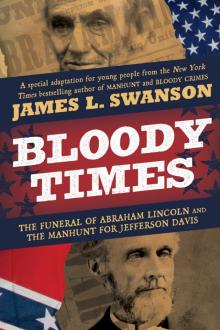 Bloody Times: The Funeral of Abraham Lincoln and the Manhunt for Jefferson Davis
Bloody Times: The Funeral of Abraham Lincoln and the Manhunt for Jefferson Davis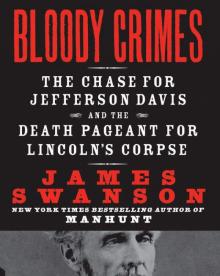 Bloody Crimes: The Funeral of Abraham Lincoln and the Chase for Jefferson Davis
Bloody Crimes: The Funeral of Abraham Lincoln and the Chase for Jefferson Davis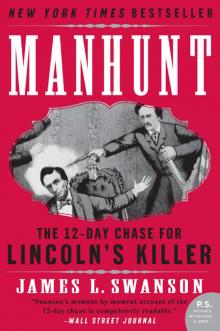 Manhunt: The 12-Day Chase for Lincoln's Killer
Manhunt: The 12-Day Chase for Lincoln's Killer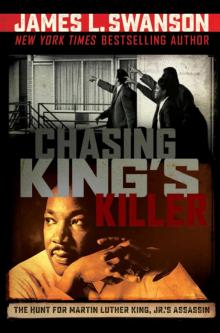 Chasing King's Killer: The Hunt for Martin Luther King, Jr.'s Assassin
Chasing King's Killer: The Hunt for Martin Luther King, Jr.'s Assassin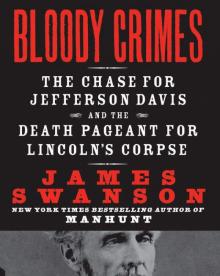 Bloody Crimes
Bloody Crimes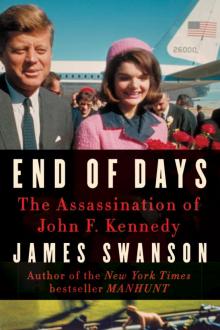 End of Days
End of Days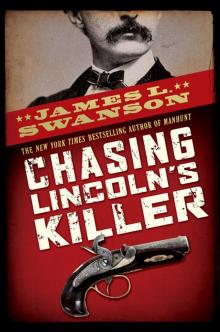 Chasing Lincoln's Killer
Chasing Lincoln's Killer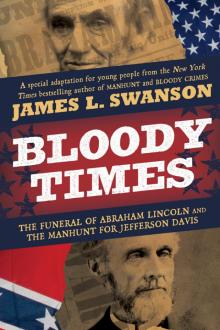 Bloody Times
Bloody Times Manhunt
Manhunt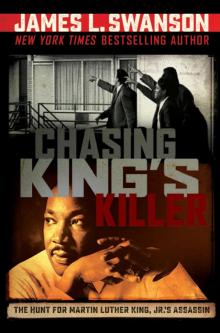 Chasing King's Killer
Chasing King's Killer